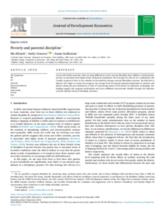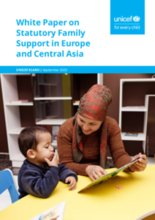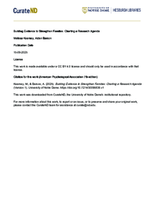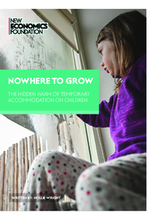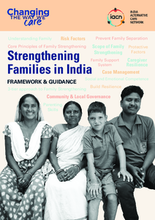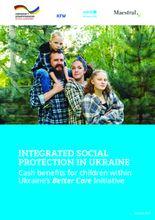Displaying 1 - 10 of 271
This study examines how the introduction of a conditional cash transfer program in Peru affects parental discipline practices. It finds that in districts receiving the program, reports of physical punishment by mothers and fathers among low-income families decrease by at least 2.7 percentage points (11%), suggesting the program may provide additional benefits by reducing harsh disciplinary practices.
Governments across Europe and Central Asia have advanced child care reforms, yet many children—especially those with disabilities or from marginalized communities—still face risks of separation without strong statutory family support systems in place. This White Paper outlines the essential policies, services, workforce standards, and rights-based approaches countries need to prevent unnecessary separation, strengthen families, and ensure every child can grow up safely in a supportive family environment.
This paper outlines a research agenda to guide the initial stages of work of the new Notre Dame Strengthening Families (NDSF) Research Initiative in the U.S. This initiative is focused on building knowledge around the economics of families and evidence-based ways to promote and strengthen healthy families.
This report exposes the severe harm temporary accommodation inflicts on children’s health, education, and wellbeing, with over 160,000 affected across England and rising numbers in London, particularly Southwark. It calls for urgent reforms—including stronger accountability, better inter-agency coordination, and dedicated support roles—to protect children’s rights and prevent lasting damage.
Strengthening Families in India: Framework & Guidance, jointly developed by India Alternative Care Network (IACN) and Changing the Way We Care (CTWWC), aims to consolidate existing knowledge, interventions, and promising practices led by government bodies and civil society organizations across India.
This meta-analysis examines the impact of supportive housing on child welfare outcomes, focusing on whether it reduces foster care placements, facilitates family reunification, and decreases homelessness and subsequent child welfare reports in the United States.
This study found that parental poverty is a key factor pushing children in Akwa Ibom State, Nigeria into street life, where deprivation drives them to engage in delinquent activities such as theft, drug peddling, and begging. The findings highlight urgent gaps in child welfare and social protection, calling for targeted interventions to address poverty, improve access to education and healthcare, and strengthen support systems.
This publication examines the role of an integrated social protection system in strengthening family resilience, preventing family separation and supporting child protection and care reform. The brief outlines how coordinated cash transfers, social services and case management can more effectively address multidimensional vulnerabilities faced by children and families, particularly in the context of conflict, displacement and decentralization.
Case studies from Peru, Cambodia and DRC provide lessons on how income support can contribute to keeping children safe.
In Kenya, economic challenges often force families to place their children in residential care facilities (sometimes referred to as orphanages), leading to long-term negative impacts.

